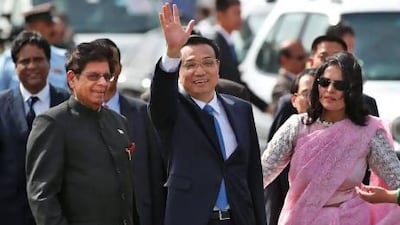NEW DELHI // China's new prime minister arrived in India yesterday on the first stop of his maiden foreign trip, with recently renewed border tensions and bilateral trade at the top of the agenda.
Li Keqiang, in a statement quoted by China's Xinhua news agency, said his choice of India as first destination "indicates the great importance Beijing attaches to its relations" with New Delhi.
The Indian foreign ministry spokesman, Syed Akbaruddin, said exchanges were aimed at "enhancing trust" between the two countries, who fought a brief but bloody war in 1962 over conflict on the border.
The Asian giants have held 15 rounds of high-level talks but the dispute in the Himalayan region of Kashmir remains unresolved.
The border row again flared last month after India alleged that Chinese troops intruded nearly 20 kilometres into Indian-claimed territory, triggering a three-week stand-off.
Mr Akbaruddin said the Chinese premier would have a "restricted meeting" with his Indian counterpart, Manmohan Singh, before a state dinner.
Mr Li and Mr Singh will hold formal "delegation-level" talks today, which will be followed by some agreements, he said.
The talks today will also cover bilateral trade, another Indian foreign ministry official said, with India pressing for more access to the Chinese market.
Mr Li will also meet other Indian leaders including from the main opposition Bharatiya Janata Party.
Mr Li will travel tomorrow to India's financial hub Mumbai, and then a day later to Pakistan, Switzerland and Germany.

